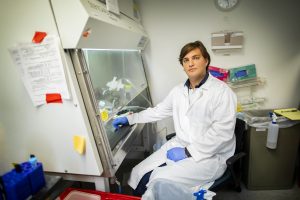2020 Mentored Investigator Grant Recipient — Morozov Yaroslav, PhD
Project Summary
Cancer cells display uncontrollable growth and high genetic instability. These properties usually result from the cancer cells disabling internal mechanisms of growth control by acquiring mutations that disrupt genes that limit cellular proliferation and repair DNA damage in order to maintain genome integrity. Many of the genes targeted by mutation in cancers are therefore called oncosuppresors. One of the cellular systems of critical importance is the set of genes that encode for proteins involved in detection and proper response to DNA damage. Mutation of a set of genes involved in a form of DNA repair known as homologous recombination make patients particularly prone to ovarian and breast cancer. BRCA1 and BRCA2 mutations provide prominent examples of this relationship. The ATM gene is also among the most important DNA repair genes involved in suppressing cancer. ATM loss is found in breast, ovarian, gastric, and hematopoietic cancers, while inherited mutations cause the syndrome Ataxia Telangeictasia. ATM orchestrates correct responses to a severe form of DNA damage known as double stranded brakes (DSB) caused by certain chemicals or radiation, and ensures successful repair or cell death if damage is irreversible. Loss of ATM function makes cancer cells deficient in repair of DNA double stranded brakes, thereby resulting in cellular lethality to common treatments such as irradiation and clinically approved chemotherapeutic agents, such as Topoisomerase I inhibitors (TopoIi) and poly(ADP) ribose polymerase (PARP) inhibitors (PARPi). Each of these agents causes increased DNA double stranded breaks. One of the major problems in cancer treatment is acquired resistance of the tumor to chemotherapy. It was recently reported, that ATM deficient cells gain resistance to DNA double stranded break inducing drugs through loss of five members of a DNA repair complex known as BRCA1-A. It is imperative to define the molecular mechanisms of resistance to these agents in the setting of ATM deficiency, given the widespread use of these clinically important agents. In this study we propose comprehensive genetic and biochemical analysis of ATM deficient cancer cells derived from patients. Using recently developed methods of mass spectrometry in collaboration with Dr. Benjamin Garcia at the University of Pennsylvania, we will study repair processes on damaged DNA in the context of ATM deficiency and compare them to repair in normal cells and cancer cells with other genetic backgrounds. This will allow us to find the difference in proteins involved to this process, which will shed light on the global mechanism of DNA double stranded break repair and response to PARPi and TopoIi in the context of different underlying genetic changes that cause DNA double stranded break repair deficiency. Understanding of molecular mechanisms of DNA repair in ATM deficient cells and processes involved in resistance to chemotherapy will enable us to find ways of overcoming resistance and increasing the efficiency of current and potential anti-cancer drugs.
This grant was made possible by generous donations from Ben Clark, in loving memory of Johanna M. Clark, and Rock ‘N Run.
Bio
Dr. Yaroslav graduated from School of Biology of Moscow State University in 2010 and got a Specialist degree (equals to Master of Science). As an undergraduate student he was involved to studies of mitochondrial F1Fo-ATP synthase. His Master's Thesis research was done in a lab that specialized on cell signaling in human adult stem cells. He found, that endogenous hydrogen peroxide modulates the signal from membrane growth factor receptors, providing the opportunity for the cell to react according to the current conditions. He got Severin’s Prize award for my undergraduate research in 2008.
For his PhD work he decided to return to mitochondria research and enrolled at the Rowan University School of Biomedical Sciences. He joined Dr. Temiakov’s lab and was studying replication and expression of human mitochondrial genome. For this work he was awarded with Rowan University Award for Excellence in Graduate Research in 2015. He graduated in 2016, and spent two years completing his projects.
Currently he is a Postdoctoral Research fellow at the University of Pennsylvania, and works with Dr. Greenberg on molecular mechanisms of resistance of ATM kinase deficient breast and ovarian cancer cells to chemotherapeutic drugs. The development of this project will expand our knowledge of basic mechanisms of genome maintenance and DNA repair and may benefit patients with ovarian cancer.
